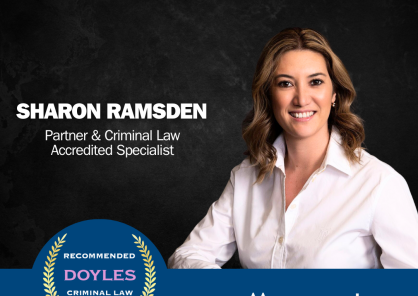
26 Feb 2025
Our expert Criminal Law team have successfully represented clients in all types of Criminal Law cases, in the Local, District and Supreme Court of New South Wales. If you have been arrested or would like to find out what rights you have, make an appointment today with one of our team. Experience matters, don't settle for less, our solicitors are experienced in all areas of Criminal Law including:

The department is headed by Partner, Sharon Ramsden with the support of, Partner, Rylie Hahn-Hamilton. Sharon is an Accredited Specialist in Criminal Law, appearing in all Jurisdictions in NSW and other Criminal Courts across Australia. Rylie has practised exclusively in the area of Criminal Law appearing daily as an advocate in the Local Courts across Sydney and Greater Sydney Metropolitan. The team has a wealth of experience that only comes from specialising in crime. Each is able to assess the merits of a case, communicate them clearly and advocate on your behalf. It is unlikely that you will find better hands on solicitors in the State.
If you would like to make an appointment to see one of our Criminal Law Solicitors please click here.
There certainly is. Whilst it really is the role of Police to assist you in these types of situations, they are not always properly resourced with the staff or experience to deal with what can be very difficult situations.
You have the right to make an application for an Apprehended Personal Violence Order (APVO) in the Local Court. Your case will be heard by a Magistrate who will, if necessary, make an order that certain individuals do not assault, molest, harass intimidate or interfere with you and your family. Once an order is made, any breach of that order may result in serious punishment including a prison sentence.
However, the Magistrate may also refer the case to conciliation to avoid a Court case.
We are able to assist in advising and representing you in these types of situations.
Firstly, “section 10s” are now formally called Conditional Release Orders without Conviction. Whether you can get one, depends. The objective gravity of the offence, when you entered your plea of guilty (sentence discounts) and the considerations under section 10.
A work licence is no longer in existence in NSW, it used to be. There is a misconception people without a licence, who are suspended or disqualified, can obtain a licence specific to driving to and from work.
If you are a Provisional licence holder, then you can lodge a licence appeal with the Court to appeal against the suspension. Full licence holders can only do that if it is a speed of more than 30km/hour. Otherwise, if it is a full licence demerit point suspension, there is no right of appeal at Court. You can opt for a good behaviour licence. It is a gamble.
It is advisable, however, a pair of chinos, or a button up collared shirt is acceptable.
Generally, yes, but without it, they can be limited to access and the process of getting it can be longer. They use software called “Cellebrite” and it downloads the entire contents of the phone. If they do not have the passcode, it can stop them, or become harder to complete the download.
No you do not. Except where you have been served a Digital Access Warrant, but that is in limited circumstances. If Police generally seize your phone and you are asked what the passcode is, you have no obligation to provide it to them.
No, I should not. If you have a lawyer attend the Police station, you can be given a “special caution”. Following the special caution, anything you do say, or don’t say, can be used as evidence against you in Court.
No, generally you do not. You have a right to silence and can decline to answer any police questions, it is generally advisable that you decline any interview.
Yes. Social security fraud is a particularly difficult and technical area of the criminal law. Prosecutions of this type are launched under federal legislation and cases are considered on the basis of the Commonwealth Criminal Code.
The evidence presented by the prosecution is often complex and intimidating to those who are not well versed and experienced in these matters. Many prosecutions under this type of legislation are open to challenge and it is important to ensure that your legal representative is knowledgeable in this challenging area of the law.
The short answer to this question is 'yes'. However, whilst the Police have a number of powers to compel people to do things during the course of an investigation, they do not have the power to conduct what are referred to as intimate forensic procedures which include taking a DNA sample from a person without their consent. Providing a DNA sample is a painless procedure which involves the collection of fluid from the mouth of the person using a soft 'swab'. It is not a medical procedure.
If the person does not give consent to providing a sample, the Police have to apply to a Magistrate to justify the reasons for wanting to take the sample which includes what basis they have for suspecting the person in question is involved in the investigation.
There certainly is. People who have not been diagnosed as 'mentally ill' but are suffering from a condition for which treatment is available by a medical health professional, or are developmentally disabled, can be diverted from being dealt with in the criminal justice system in certain circumstances. Their case can be presented so that the Court will consider not recording a conviction or even a finding of guilt against them. Rather, the Court may direct the charge be dismissed upon condition the person continue with a certain course of treatment.
Generally speaking, a person who is under arrest can be detained by Police for the period of time that is referred to as ‘the investigation period' . This period referred to as a reasonable time, as set out in the legislation that give Police the power to hold a person against their will.
However, the Police are not permitted to hold the person for more than 4 hours unless given an extension by a Court or as set out in what is known as an investigation warrant that they have got from a Justice prior to the arrest. In determining what is a reasonable time, certain periods can be disregarded as dead time. Periods which can be treated as 'dead time' include:
As a general rule, the person must be released during the investigation period or brought before a Justice, Magistrate or Court within the investigation period or 'as soon as practicable' after the end of that period.
People (especially young people) need to remember that what is considered to be a minor offence by certain members of the community in this country is not always the case overseas. If you are found guilty of a drug related offence (no matter how small the amount) you may face considerable difficulty in gaining a visa or entry into an increasing number of countries that include the United States and the U.K.
You should also understand that a 'conviction' on a person's record remains on a person's record for a number of years and every time you apply for a job, the odds are that you will have to declare the conviction.
If a person is guilty of a crime (even crimes that are not trivial) the court has the discretion to not record a conviction against them. A conviction recorded against a person can have an effect on a person's life and reputation over many years. For that reason it is most important that your case is argued in court in the most thorough and competent manner. Sometimes, a person thinks that they are guilty of a crime when they are technically not guilty. To guarantee the best result you should be represented for any matter.
You have a number of options:
Absolutely. Even if you have done nothing wrong and have a clear conscience, you need to get legal advice before you say anything to the Police. Our legal system ensures that an accused person has the right to remain silent when spoken to by the Police and if that person exercises their right to silence it cannot be held against them. There is no doubt a telephone call from a Police officer can cause great stress and discomfort to a person, even when they have done nothing wrong. The most effective way to deal with this is to have a lawyer contact the Police and act on your behalf from the start so that your rights are protected.
That depends upon the lawyer that you get. Drink driving offences can carry with them jail sentences where it involves high range (over 0.150) or middle range (over 0.08). Also, a person who is convicted of a drink driving offence faces automatic disqualification of 3 years for High Range, 12 months for Middle Range and for Low Range (0.05 to 0.08) 6 months. The 'automatic' periods of disqualification may be varied by the court to 12 months - High Range, 6 months - Mid Range and 3 months - Low Range.
If the person before the Court has a conviction for a similar 'major offence' within the previous 5 years the penalties are much higher.
In 2007, the New South Wales Supreme Court handed down a Guideline Judgment in relation to high range drink driving offences. This was relevant to people charged with all types of drink driving offences because the principles set out by the Supreme Court are followed by most Magistrates sitting in the Local Courts. One of the points the Supreme Court made was that "automatic means automatic" as far as disqualification is concerned, unless there is good reason demonstrated as to why the automatic period should be lowered.
The Guideline Judgment also makes it very clear that courts should consider sending people to prison for High Range offences in circumstances where there is increased moral culpability.
Magistrates in the Local Court hear many drink driving cases each day. The reality is that in order to obtain the best result possible and to get you back on the road as quickly as possible, you may need careful and considered legal representation.
There is an appeal process for both types of licence which may end in your case being considered by the Administrative Decisions Tribunal. The New South Wales Police Firearms Registry is responsible for the granting of firearms licences in this State, as is the New South Wales Police Security Registry in relation to the regulation of licence holders in that industry. Whilst both governmental agencies have the best interests of the community at heart, they are also capable from time to time of not fully considering the interests of the licence holder or, on occasion, make an error as to the operation of the law.
The appeal process for both types of licence involves a number of steps and time limits that need to be complied with.

26 Feb 2025

1 Oct 2024

19 Jul 2024